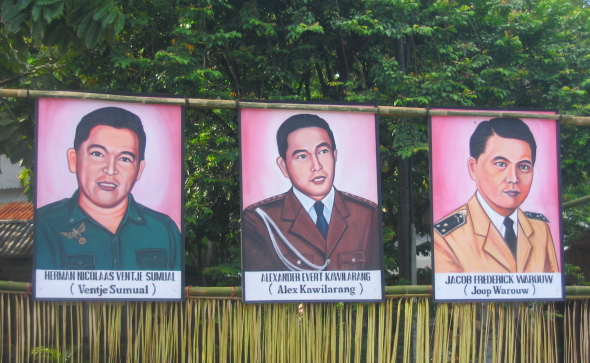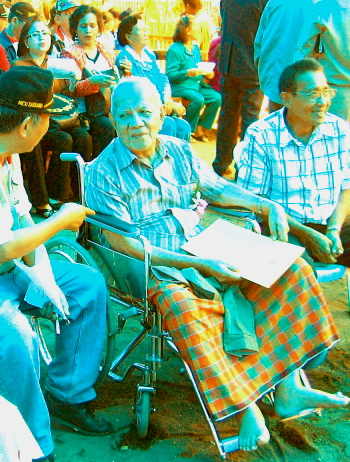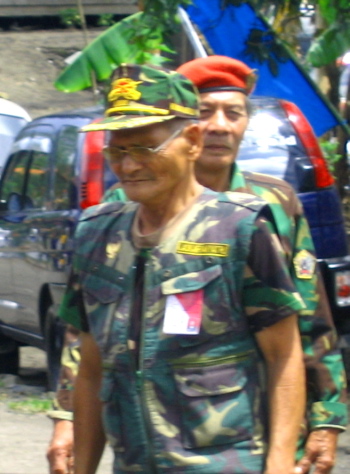Fifty years on, memories of civil war are kept alive in North Sulawesi
Amelia Liwe
Permesta veterans arrive for the celebrationsAmelia Liwe |
On 4 March 2007, a ceremony was held in the remote village of Kota Menara in North Sulawesi to mark the 50th anniversary the birth of Permesta, a protest movement that became part of an armed conflict between the Indonesian state and some of its outlying regions in the late 1950s. As visitors approached the village along a narrow bumpy road that led off the main highway from Manado, the provincial capital, they passed three large posters of former Permesta leaders – Ventje Sumual, Joop Warouw and Alex Kawilarang – prominently displayed for all to see. Nearby an equally large banner read ‘Welcome to the Permesta Tourism Destination of Kota Menara in the Jubilee Year of the Universal Struggle Charter, 2 March 2007’.
Kota Menara itself was neat and clean, as though it was ready to receive guests. A crowd was gathering around a big blue tent in the middle of the village, where a stage had been erected and a display of red and white flags and representations of the Indonesian coat of arms created the impression that an important national event was about to be celebrated. Another large poster containing the words of the Permesta charter – under its unabbreviated title of Perjuangan Semesta (Universal Struggle) – added an air of dignity and solemnity to the occasion. A banner over the stage called on adherents to the charter to unite in the interests of the Indonesian people and their republic, while in front of the stage the names of the charter’s signatories were listed on another large poster. The overall effect was to make Permesta a part of the Indonesian nation and its history.
Universal struggle
The Permesta charter was signed by representatives of military and civilian groups in Makassar, South Sulawesi, on 2 March 1957. It expressed a demand for greater regional autonomy and a determination to resist the over-centralised direction being taken by the Indonesian state, thus registering a political protest against the government of the day. However it did not see itself as a secessionist movement. Colonel Ventje Sumual, the commander of the Eastern Indonesia Military District, declared at the time that Permesta ‘is in no way meant to be a breaking away from the Republic of Indonesia’.
Within months, the movement had extended to the Manado and Minahasa regions of North Sulawesi, where the Minahasan local army commanders soon declared their solidarity with a new regional protest movement that was proclaimed in West Sumatra on 15 February 1958. This movement called itself Pemerintah Revolusioner Republik Indonesia (PRRI, The Revolutionary Government of the Republic of Indonesia), and when the two movements found common cause as PRRI/Permesta, the stage was set for armed conflict. Within days, the central army leadership in Jakarta despatched troops to storm the two regions, thus sparking a civil war.
 |
Banners depicting former Permesta leaders greet the guestsAmelia Liwe |
There was also an international dimension to the conflict. Amid the Cold War tensions of the time, the United States interpreted the dissatisfaction that had been brewing in the regions as a desire for secession. From the US perspective, a secessionist movement in Sukarno’s Indonesia was to be encouraged, because its success would contribute to the US aim of confining the influence of the Indonesian communists to the island of Java. Through the CIA and its allies, Washington flooded Sulawesi and West Sumatra with arms and supplies, pushing the Permesta and PRRI groups towards an ill-advised military campaign against the central government. In the end, PRRI/Permesta was a humiliating failure, both for the US and its local allies. The fallout left deep scars, not only on the US-Indonesia relationship, but also on social and political life in the regions concerned. Throughout the rest of the Sukarno period, local communities in Sulawesi and West Sumatra were viewed with suspicion by the central government, and local elites had little access to the political intrigues and networks that influenced the course of events in the capital.
Memory and history
The outcome of the regional rebellion had a decisive impact on the written history of PRRI/Permesta. As early as August 1958, while conflict was still ongoing, the Army high command published a history of the movement that demonised its founders and their intentions and declared the ‘Universal Struggle’ to be already lost. Subsequently, Indonesian historiography gradually marginalised and simplified the history of PRRI/Permesta, reducing the complexity and multidimensional character of the movement. After more than 50 years only very few academic historians have given it serious attention. For the survivors, however, the history of those events of 50 years ago is clearly embedded in memory.
The commemoration that took place in Kota Menara in 2007 was the climax of a number of events marking the jubilee of Permesta in North Sulawesi. The formal ceremony that day included a Sunday church service and intercessory prayers led by representatives of all the Christian denominations in the area, as well as a long address by the head of the newly-established district of South Minahasa, to which Kota Menara belonged. This was followed by a festive meal, as a number of Permesta reunion groups chatted and mingled in a celebratory and nostalgic mood. Some proud former fighters, both men and women, came wearing military fatigues, complete with their red berets. Some spontaneously expressed their nostalgia by singing songs from the time of the civil war. Others told humorous stories of their experiences at the time.
‘We were neither half-hearted soldiers nor separatists! We gave everything for Indonesia!’
Amid the festive mood, a small circle of former Permesta leaders were engaged in serious conversation. ‘Those old soldiers have no idea of the political dimensions of Permesta,’ complained one old battalion commander. Nun Pantouw, another former commander and intelligence officer now confined to a wheelchair, said little, but he still radiated his former charisma. As the talk passed back and forth among the group, Lengkong Worang, who led the Permesta deputation to the signing of the peace accord that marked the end of the fighting in 1961, kept returning to the same theme: ‘It is not right to call Permesta a rebellion, let alone a separatist movement,’ he declared. Referring to the first comprehensive study of the Permesta movement in English, Barbara Harvey’s Permesta: Half a Rebellion (translated into Indonesian as Permesta: Pemberontakan Setengah Hati or Permesta: A Half-Hearted Rebellion), Worang exclaimed, ‘We were neither half-hearted soldiers nor separatists! We gave everything for Indonesia!’.
A new generation
 |
Former leaders chatting after the ceremonyAmelia Liwe |
The golden anniversary of Permesta has now passed. However the labour of memory continues. Reunions, discussion groups and online discussion forums are some of the venues where the remaining Permesta actors, their families and friends, keep the memories alive, as they try to understand the movement and the civil war which they or their relatives experienced. The largest of these groups is the Facebook page ‘Permesta bukan Pemberontakan!’ (‘Permesta was not a Rebellion!’). The page states that the group is not setting out to create a new movement, but merely to provide a space where people can exchange information and stories about their grandparents’ experiences at the time of Permesta. With more than 3000 members, the group is open to anyone who wants to participate. Stories, recollections and opinions all circulate on the site. Some are nostalgic, others provide historical information, while still others make purely rhetorical claims. The initiators hope that the site will provide good feedback for ‘our beloved North Sulawesi’.
Most of the major actors have gone. Herman Nicolaas ‘Ventje’ Sumual – the last surviving commander of PRRI/Permesta, passed away on 28 March 2010. His gravestone inscription cites in English the words of St Paul, ‘I have fought a good fight, I have finished the race, I have kept the faith.’ Now, a new generation is collecting stories, facts and interpretations that help them understand the events that have shaped their communities and their nation. Somewhere between memory and history, the past continues to be kept alive.
Amelia Liwe (amelia.liwe@gmail.com) recently completed a PhD in Southeast Asian History at the University of Wisconsin-Madison.











